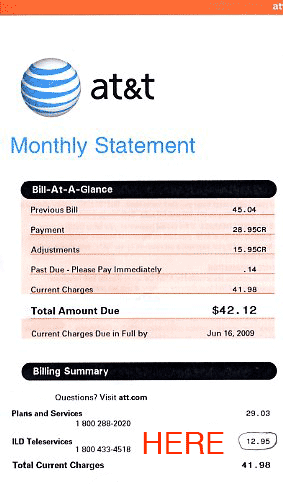
Cramming
After years of mystery phone charges for long distance services, ringtones, software backup, and phone entertainment customers never signed up for, the Federal Communications Commission today announced it was getting tough with more than $11 million in fines against some of the companies responsible.
Phone cramming — the practice of signing you up for paid services you never ordered, wanted or needed, has been a perennial problem ever since telecommunications reform allowed third parties to charge for their dubious services on monthly telephone bills. In return, phone companies collect a substantial piece of the action, leading some critics to charge Ma Bell has a financial interest in keeping phone cramming alive and well.
Helping increase the confusion, most cramming charges are listed under innocent-sound names like “long distance discount plan,” “protection plan,” or “ring choice.” Most are buried under “other charges” found on the back of the bill or somewhere on the second page. The monthly charges can range from $2-20 — the smaller the amount, the less likely it will be questioned by a cramming victim.
Some of these charges have been collected from unsuspecting customers for years.
Now FCC Chairman Julius Genachowski has proposed fining the worst offenders $11.7 million for violating the agency’s cramming rules.
“We’ve seen people getting charges for yoga classes, cosmetics, diet products, and, yes, psychic hotline memberships,” Genachowski said. “These mystery fees are often buried in bills that can run 20 or so pages, and they are labeled with hard-to-decipher descriptions like USBI.”
The targets of the fines: Main Street Telephone; VoiceNet Telephone, LLC; Cheap2Dial Telephone, LLC; and Norristown Telephone, LCC.
Customers who do ferret out cramming charges run into roadblocks trying to get their money back. Telling customers they themselves authorized the charges, several crammers refuse to provide refunds or only agree to stop future charges, while keeping the money they already collected. Other customers seeking refunds from phone companies find themselves in a loop of “buck-passing,” as companies like Qwest redirect callers to the crammers to get charges credited back.
The Senate Commerce Committee will hold hearings on phone cramming soon and issue a report on the ongoing problems this practice causes customers, according to Sen. Jay Rockefeller (D-WV).
[flv width=”480″ height=”380″]http://www.phillipdampier.com/video/WISH Indianapolis Phone Cramming Durham 12-17-10.flv[/flv]
WISH-TV in Indianapolis has spent years tracking the exploits of former-local businessman Tim Durham, who allegedly wiped out the savings of thousands of people, was blamed by one victim for the death of his elderly mother, and was implicated indirectly in a phone cramming operation. (13 minutes)
[flv width=”480″ height=”290″]http://www.phillipdampier.com/video/KSTP Minneapolis Victims of Bill Cramming 1-7-11.flv[/flv]
KSTP-TV in Minneapolis provides raw video of Greg Carlson of Eagan and Matt Rohn of Northfield sharing their stories about being crammed by USBI for long distance on their Qwest bills. (6 minutes)


 Subscribe
Subscribe
Our company’s smart phone bills always were getting crammed with illegal services for anywhere from $9.95 to $14.95/mo, and caused tens of hours of wasted time calling AT&T trying to get them removed as they tried to pass the buck to the con artists that crammed the fees in the first place and wouldn’t remove them. It would often take up to 3 months before they’d be removed and credited.
I am still fighting with Virgin Mobile over cramming on a prepaid account. I try to remember and always put a block on third party charges on every phone line I have. It is an option with most providers, but one buried on their website in the fine print.